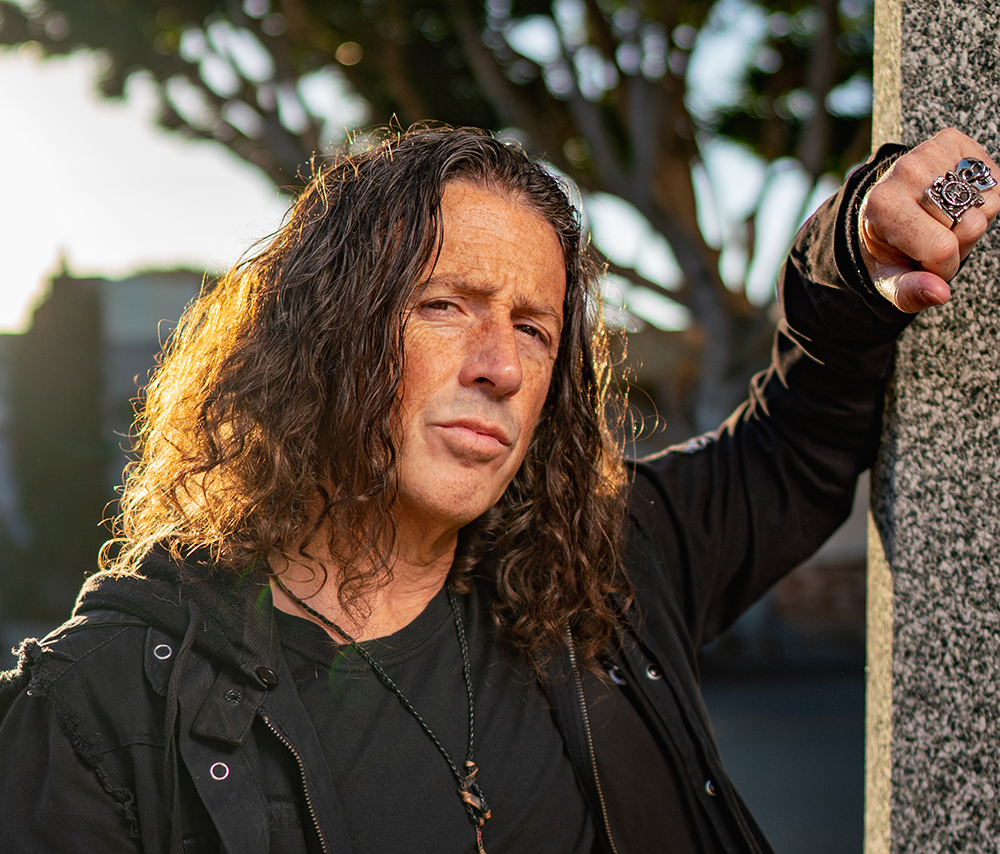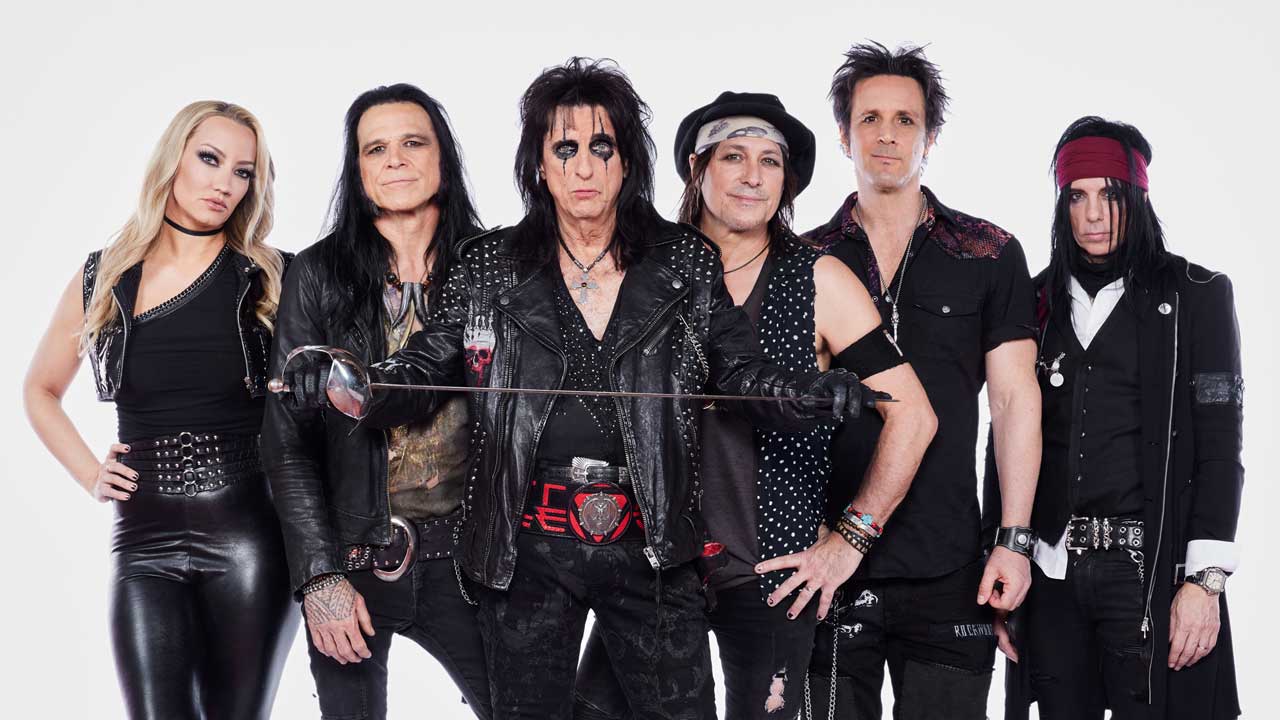Farewell to Kings: how Kiss built and sustained The Greatest Show on Earth for 50 years
Kiss are preparing to close the door on their remarkable career. As with all the greats, we will never see their like again...
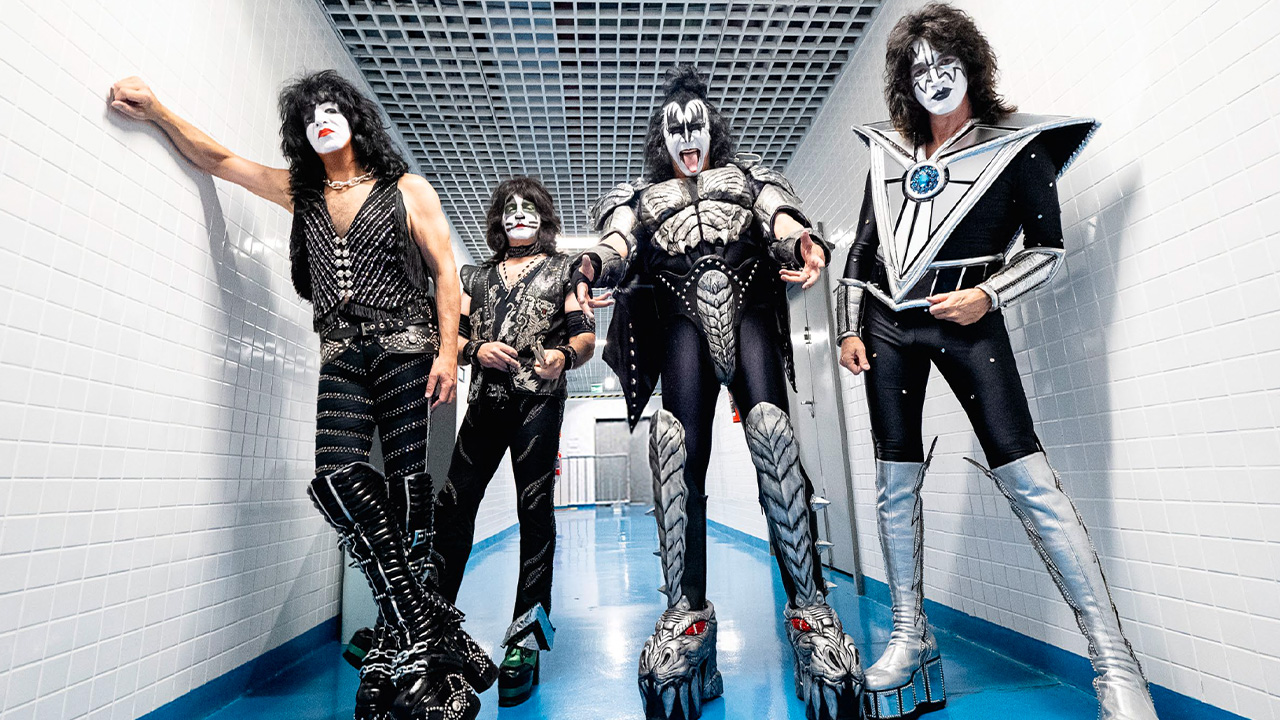
São Paulo, May 2022
For just a nanosecond, we have stumped Gene Simmons. Which is really difficult to do. For 50 years, Kiss have shared stages around the world as opening act, co-headliners but mainly headliners with seemingly every major band around. When asked if there were any bands that he wishes Kiss could have played with but never got the chance, he says: “The Beatles. The Beatles in their prime. They bring all their tricks, we bring all our tricks. You’d get a cross-section of fans. And The Beatles would clearly win with music, but we’d kill ’em with the show. We would crush them. I say that lovingly, because that’s my favourite band of all time.”
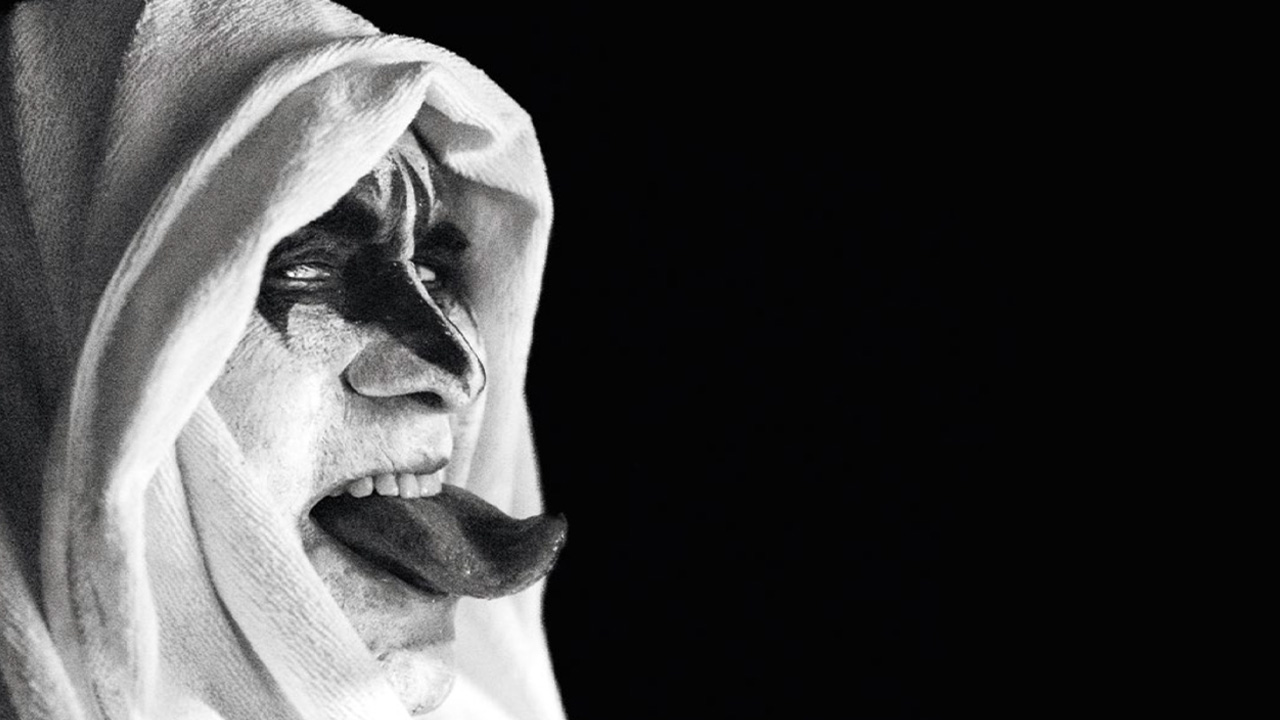
New York City, 1975
By the spring of 1975, the members of Kiss – vocalist/guitarist Paul Stanley, bassist Gene Simmons, lead guitarist Ace Frehley and drummer Peter Criss – should have been giving serious thought to taking their band in a radical new direction or just shutting it down altogether. Whatever they were doing, it just wasn’t working.
It wasn’t for a lack of hard work. The New York- based quartet officially formed in January 1973, after Simmons and Stanley ditched their roots- rock five-piece Wicked Lester and joined forces with the hard-charging duo of Criss and Frehley.
Kiss were gigging in less than a month, and by late summer they had scored a major-label deal with Casablanca Records. In the next two years, Kiss proceeded to release three polished, pop- savvy, rock albums (Kiss and Hotter Than Hell in ’74, Dressed To Kill in ’75), but the fame that they deeply believed was theirs for the taking continued to elude them.
They’d had plenty of hits by then – fist- pumping, radio-friendly parking-lot anthems about sex, parties and rock’n’roll, packed with riffs big enough to knock satellites out of orbit. They had the look, too: that bewitching collision of glam, heavy metal, horror and fantasy, playing out as painted faces, dressed in leather and studs, spitting blood, breathing fire and unleashing holy hell on gobsmacked audiences. Commercially, however, there was little correlation between the surging audience numbers at their live shows and the middling sales of the three albums, which in total fell short of 300,000.
Sign up below to get the latest from Classic Rock, plus exclusive special offers, direct to your inbox!
If they could transmit the electrifying energy of their live show to people who had never even heard of them, much less seen them in concert, then they could conquer the planet. But aside from the challenges of bottling an eye-popping visual spectacle into an audio format, if the three albums weren’t selling, then where was the sense in repackaging those same songs as a live album?
Propelled by steroidal self-confidence, they recorded five shows in the spring of 1975, and in September released Alive!, a marauding double live album that stormed the US Top 10, rode the charts for 110 weeks and launched Kiss into the stratosphere. Today, Alive! is regarded as one of the greatest live albums of all time and has sold nearly 10 million copies.
São Paulo, May 2022
Today the band are hunkered down in their São Paulo hotel on a day off. Kiss – now Paul, Gene, guitarist Tommy Thayer and drummer Eric Singer – have long transcended the music, emerging as a major brand in pop culture; even people who couldn’t care less about music recognise the band’s painted faces and iconic logo.
Just two nights ago they took the stage at Allianz Parque Stadium in São Paulo, Brazil, before a frenzied, sold-out audience exceeding 60,000. It’s something Gene wants to make sure we know before our interview, so he directs their tour manager to send over a raft of tweets, photos, videos and drone footage from the show.
Gene is affable, chatty and he listens intently, which isn’t all that common among artists in his league. Interviews are, by definition, one-sided affairs, but occasionally you find the odd artist who prefers to have a conversation. Gene is one such artist. Now a hale 72 years old, he’s not above the odd boomer joke. At one point, towards the end of the interview, he says: “These are semantics. But I’m not anti-semantic. Ha ha.”
Oof.
In many ways, South America never left the 1960s in terms of pure rock’n’roll chaos. Few bands engender the manic, street-clogging hysteria that Kiss do, and Gene is here for it. “We’re trapped in the hotel. We literally can’t leave. It’s nuts. And fun. All these South American shows are like that. They’re just over-the-top. We’re going to play Mexico City, and they’re expecting ninety to a hundred thousand. It’s nuts.”
It’s always nuts when Kiss drop into South America, but this tour is different because its the very last one – it’s The End Of The Road Tour.
Still in São Paulo, May 2022
Originally announced in 2018, The End Of The Road Tour has been touted as the band’s final campaign – a global victory lap spanning multiple years, countries and continents. It kicked off in January 2019. Then the pandemic slammed the brakes on, resulting in scores of cancellations and postponements. Last August, just as the band were starting back out, Gene tested positive for covid, and Paul caught the virus twice in the final six months of the year.
While both reported mild symptoms, Paul’s longtime guitar tech, Francis Stueber, died of the virus. Currently, dates are booked through their annual Kiss Kruise, which finishes on November 3, but there are many more dates to be announced, including the location of their final show.
Paul is as friendly and chilled as you like, and delivers his answers in a slow, thoughtful cadence. Addressing the unlikeliness of a Kiss Kruise being the site for their final show, he throws us a bone: “Although I can’t really put it out there yet, it would be odd to me that we wouldn’t end in New York. So I think it’s safe to say the end will be in New York. We lost two years, but at the same time we are determined to go from here to the end – and not go quietly.”
One question we’re obliged to ask is just how serious this ‘End Of The Road’ business really is. After all, Kiss announced their first farewell tour in 2000. Ace and Peter had rejoined the band in 1996, following acrimonious departures in the 80s, and the guys swore that that 2000 tour would be their last. Just two years later, the band returned with Tommy and Eric having replaced Ace and Peter respectively, establishing Kiss’s current and final line-up.
“Circumstances are very different.” Paul says. “When we did that [2000] farewell tour, we in essence drank our own Kool-Aid. The idea that the band couldn’t continue without the four original members was absurd. Frankly, we were miserable as a foursome. It was horrible. It turned into years of drudgery and uncertainty whether everybody was going to make it to the lobby, let alone the stage. And so what we were basically doing was putting down the horse.
“Gene and I just felt: ‘Okay, we need to stop.’ And then it dawned on me that people didn’t want us gone, and we didn’t actually want to be gone. We didn’t want to say farewell to the band, we wanted to say farewell to two members.”
Gene offers a more practical reason why this tour is truly the end: “At some point, you’ve got to have some dignity and pride and quit while the gettin’s good. I’m seventy-two and still in great shape, but am I going to be convincing doing this at seventy-five? No. Because I still have to wear these dragon boots proudly. Each of them weigh almost as much as a bowling ball, on their own, plus I wear about forty pounds of armour and studs and guitars that I’m carrying around on eight-inch platform heels. You’ve got to spit fire, fly through the air and all that stuff. And you do it for two hours. I mention the Stones – and we’re all big fans – and Jagger’s in amazing shape, but he wouldn’t last a half hour in my outfit. The physicality of what we do is just crazy.”
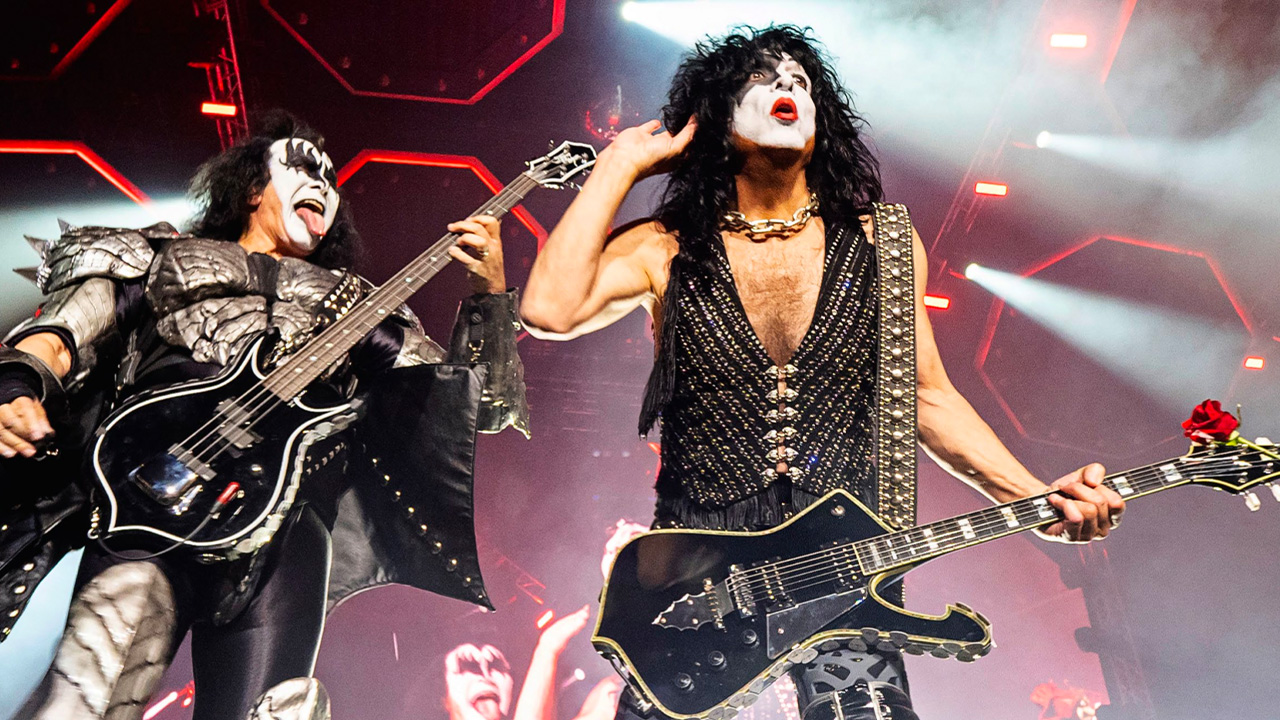
London, UK, May 11-12, 1976
Alive! catapulted Kiss on to the European scene. By spring of 1976, they had two albums in the UK chart – Destroyer and Alive! – and their leering painted faces were on the pages of magazines throughout Britain.
On May 11 they landed in the UK for the very first time, and booked in for two days of rehearsals at Shepperton Studios, just outside London. “We were flush with success from America,” says Gene. “Big time. Word had gotten out, so we were playing three-thousand-seaters in the UK. They all sold out, but we didn’t have any idea. We didn’t do interviews. We were avid readers of Melody Maker and Sounds and New Musical Express. We just read them because they were cool and they talked about all of these bands that never came over to America.”
The United States is where Kiss were formed, and South America would claim their most fanatical supporters. But since day one the UK has always been the band’s spiritual home. Looking back on that first pilgrimage, Gene recalls: “When we landed in London, for us it was holy ground. It was the home of The Beatles. I wasn’t interested in going to Buckingham Palace, all I wanted to do was go to Liverpool.”
Paul adds: “Look, whether other bands may like it or not, we’re more the bastard children of The Who, the Rolling Stones, Led Zeppelin and on, than Jefferson Airplane and Grateful Dead. We are Anglophiles, and that’s the music that has always meant the most to us, and we wanted to be embraced.”
So with the singular goal of melting every single face of their first British audience, they headed up to Manchester.
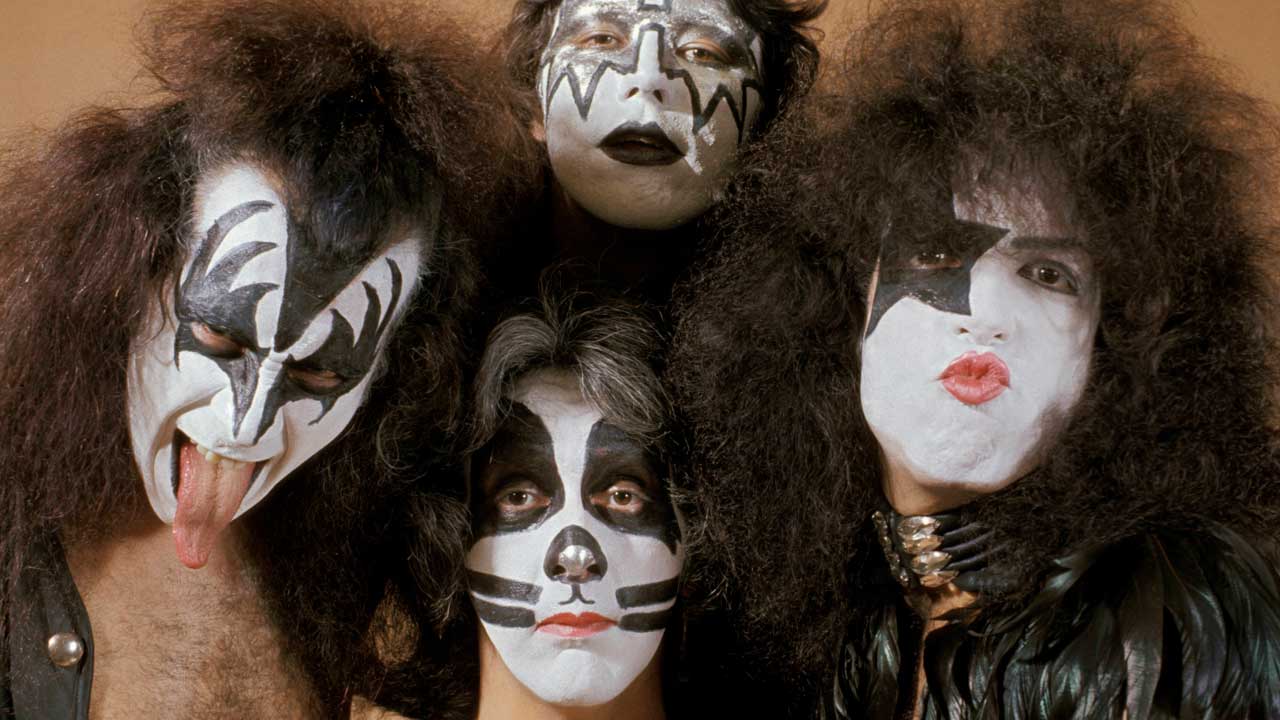
Manchester Free Trade Hall, UK, May 13, 1976
A ticket to the very first Kiss show in the UK would have set you back about £1 to £2.50. It was a bargain, because that night Kiss unleashed an absolute torrent of highly energised, arena-sized anthems, bolstered by all of the fire and pyro that the Free Trade Hall could withstand.
“We were extremely pumped,” Gene recalls. “You had that sense of danger because you were in a different country and you don’t know how they’re going to react. But they got it right away. By that time, they knew the songs and they sang along at some points. It was great. And if you read the reviews, there was a ‘there’s a new kid in town’ kind of thing.”
The first four UK gigs were all sell-outs, but that first in Manchester was an unambiguous show of force. It was featured on Tony Wilson’s television programme So It Goes, where he interviewed the band and acknowledged the surreal hype surrounding them. “On reflection,” Wilson says, “the media blitz and the spectacle came a bad second to the power of their music. If you let it – many didn’t – you could get yourself blown away by those banks of Marshall speakers.”
The connection they formed with those first UK audiences was immediate. “We were a working man’s band,” says Gene. “We were never Roxy Music. We never appealed to people of high fashion and champagne and stuff like that. It was people who had to get up and go to work and who liked, as the British say, ‘meat and two veg’. And it bears knowing that the girls were flocking. They’d all wait backstage. A lot of fun.”

São Paulo, May 2, 2022
To say that Kiss fans are different is an understatement. Most legendary bands claim rabid fan bases, but Kiss have a literal army. The Kiss Army, to be precise. Being in the Kiss Army involves more than just going to shows with faces painted like the band; it’s attending Kiss conventions, sailing away on Kiss Kruises (the Kiss Navy), and throwing mountains of hard cash at the endless commercial offerings bearing the Kiss brand – everything from comics to covid masks to condoms and even coffins (the Kiss Kasket).
Then there’s the seemingly endless parade of ‘greatest hits’ compilations, live albums and collectibles that the band regularly offer. Some people accuse Kiss of crass commercialism, placing their bottom line above the quality of their music output and treating their loyal fans like fleshy ATMs. Kiss do little to downplay the financial angle, and Gene has estimated the value of the Kiss brand somewhere between $1 billion and $5 billion.
Such criticisms ignore the wholly reciprocal nature of capitalism. Nobody forces Kiss fans to buy Kiss-branded Hello Kitty dolls, or to scoop up every super-duper deluxe box set that the band release. For the loyal denizens of the Kiss Army, every dollar spent is a proud declaration of their allegiance – a statement of who they are and the band they represent.
Although they could not have foreseen it back in 1973, their painted faces have imbued Kiss with immortality, at least in the commercial sense. While you’re not likely to find Roger Waters action figures in your local record shop, or T-shirts emblazoned with the weathered visage of 77-year- old Rod Stewart, the faces of Kiss haven’t changed in half a century thanks to the make-up (save for their Unmasked period between 1983-1996). People age, but logos are timeless.
Still, there’s a very honest emotional bond between Kiss and their fans – Paul often uses the word ‘reciprocity’ – and as this final campaign inexorably approaches its terminus, he’ll miss the interactions. “When someone says that our music got them through chemotherapy and their battle with cancer, well that’s mind-boggling,” he says. “But that we could have that kind of effect on somebody means I have a lot to live up to and it means that I have a lot to deliver with a sense of obligation to that person. Mind you, this may all sound corny, but I don’t give a shit. This is reality and it got us where we are, so anybody who dismisses it, I’d rather look at where they are.”
Occasionally the fan interactions take on more colourful shades. “A number of times there have been attractive women who have said: ‘Can I please have your sperm?’” Gene says. “I don’t mean: ‘Let’s have sex’ – that’s happened enough times – but they wanted to be able to have a child.”
Well?
“Thanks, but no thanks. Ha ha. As far as I know there are no little Genes running around.”
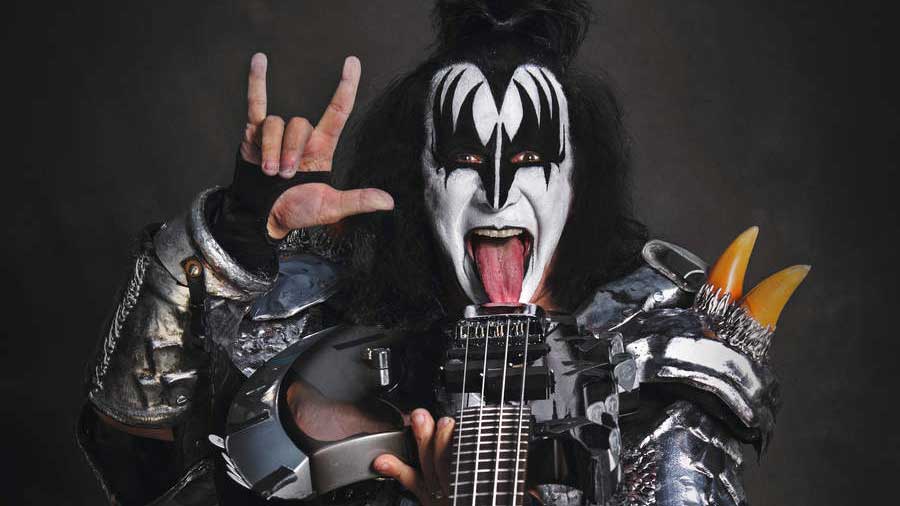
Monsters of Rock Tour, Donington Park, UK, August 20, 1988
No band trafficking in heavy music can lay claim to Britain without first treading the boards at Donington. Discussing their first appearance there, at the 1988 Monsters Of Rock, Paul says: “Donington is so revered and has such a history to it, that to participate in it, on the shores that we felt were very much responsible for our being, we had to make sure that we rose to the occasion.”
Twelve years after their first UK appearance, Kiss had long transcended 3,000-seat halls and £2 tickets. This was Monsters Of Rock, and the crowd topped 100,000. Their Donington debut occurred during the unmasked period, when they had ditched their make-up and armour, and the line- up included Bruce Kulick on guitar and Eric Carr on drums. Summer rains had reduced the grounds to a deep, shoe-swallowing sludge in which an entire city of fans drank, danced and flopped in the mud.
The day took a grisly turn, however, when two fans were trampled to death and a number of others injured as the crowd surged forward when Guns N’ Roses took the stage earlier in the day. The fatalities weren’t revealed until the next day.
Although both video and audio from that day reveal a tight, energised Kiss set, in previous interviews Paul has said the appearance was not Kiss at their best. Addressing that comment today, he explains: “I would say that what Donington and Download has seen of us since we put back on the war paint and uniforms is much more focused in terms of who we were and who we are. I don’t think the band has ever been as good as it is now; it’s never been as much fun as it is now.”
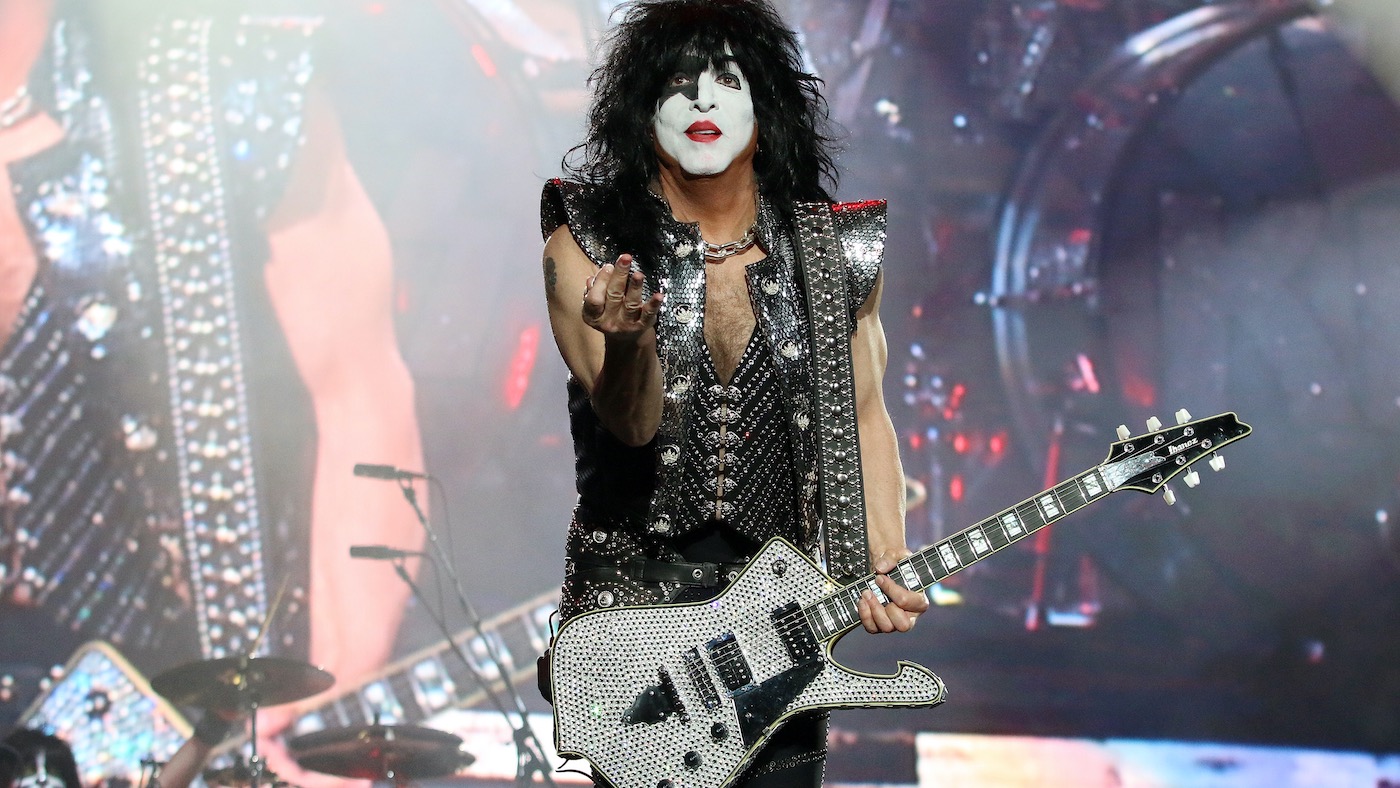
São Paulo, May 2, 2022
Ace and Peter are not as delicate a topic as one might think. Which is helpful, considering that it plays such a massive role in The End Of The Road Tour, with people wondering how, if at all, the band’s most famous alumni might be included in the festivities.
We need not dance around it – it’s something that Paul and Gene raise repeatedly throughout our interviews, often as an unexpected tangent. When asked how he thinks he might feel when Kiss finish playing the final song at their final show, Gene says: “I was hoping that Ace and Peter, at least for that, would be with us. It would be the saddest thing of all if they chose not to be there. But such is life.
“I hope and wish they’ll get over the victim, ‘look what happened to me’. No, nothing happened to you. These were all decisions you made. They were in and out of the band three different times. Can you believe that? How many chances in life do you want? That’s the saddest thing.”
And the fans?
“There are fans that are still angry with us about Ace and Peter. They just don’t understand.”
For Gene’s part, he’s trying. In April he tweeted: ‘Happy Birthday Ace. And many more... The invitations still stand. Jump up on stage with us for encores. The fans would love it.’ To date, Ace has not responded, although to be fair, he’s an infrequent tweeter at best. Addressing this tweet, Gene states: “I personally have asked Ace and Peter a number of times: ‘Hey, this is the last time around. We’ve still got another hundred cities or so to go. Why don’t you jump on stage with us?’ And they said no.”
“They said no?”
“Yeah. More than once.”
Regarding what role Ace and Peter might play in the remainder of the final tour, Paul says: “It would be great to have Ace and/or Peter participate at some point if they were interested, and if their requests or demands were realistic and not disruptive to the overall spirit of this tour.”
Tommy Thayer is the most laid-back of them all, quick to chuckle, with an easy, West-Coast chill. Although he’s been the lead guitarist in Kiss longer than anyone else, it was a position he had to earn in more ways than one.
“It wasn’t easy at first, coming in and filling Ace’s shoes,” he says. “They’re big shoes to fill, obviously, so there were a lot of eyes on me and a lot of pressure and it took time to get comfortable. To be the lead guitarist in Kiss, that’s pretty much what every kid dreams about.”
At various points, all four guys will use the family/divorce analogy when discussing past members, but both Paul and Gene go out of their way to hail the current line-up as their favourite. “When you look at a family from the outside,” says Gene, “when you find out that they split up, it comes as a shock. But the people that live with it day-to-day certainly understand. So that’s why I can’t praise Eric and Tommy enough for giving new blood and new life. Through their eyes, they’re the most grateful team guys ever.”
Friendly, somewhat serious and still retaining his thick Long Island accent, Eric takes a balanced view of his role and the context in which he earned it. “I know there are certain fans that feel a certain way about certain eras of the band, and I totally get it! I respect it. People forget that I was a huge Kiss fan from the very, very beginning. I was one of the first Kiss fans that I ever knew. And hey, if it wasn’t for the original Kiss – if it wasn’t for Peter Criss, Gene, Paul and Ace – I wouldn’t be here talking to you.”
The Popcorn Club, Queens, New York, January 30, 1973
It was a bone-chilling Tuesday night in Queens when the band rolled up to the Popcorn Club for their load-in. Although some reports say that by January 30 the band had formally changed their name from Wicked Lester to Kiss, Gene is clear that the name change came at some point between the booking of the show and when the performance took place.
“We didn’t have a manager,” he says. “So I called the guy. ‘You won’t believe this band, Wicked Lester. They do original material and, if you want, we’ll stick in a Wilson Pickett song or an Otis Redding song.’ Over the phone I sold the band to him for thirty-five dollars. Never mind that getting the truck to move our equipment and all that was going to cost more, we just wanted to flex our muscles.”
Kiss had already amassed a clutch of original material, including the songs Deuce, Firehouse and Black Diamond, and they had also committed to the idea of giving audiences something visually stunning to accompany the music.
“We didn’t sound like what we looked like,” Gene admits. “One day we went down to Woolworth, which was a chain of department stores, and bought long mirrors – fifteen bucks or something like that – and bought clown make-up, God knows why, and started putting make-up on our faces; there were no make-up artists or anything. And designs on the whiteface. Nobody could point to a reason why or what the spark was that started the fire. I don’t know. There are things in science called ‘singularities’ – they just happen.”
And so, before a small but supportive audience of less than 10 – and even then mainly girlfriends and friends – four local dudes wearing face paint ripped into Deuce. And music would never be the same again.
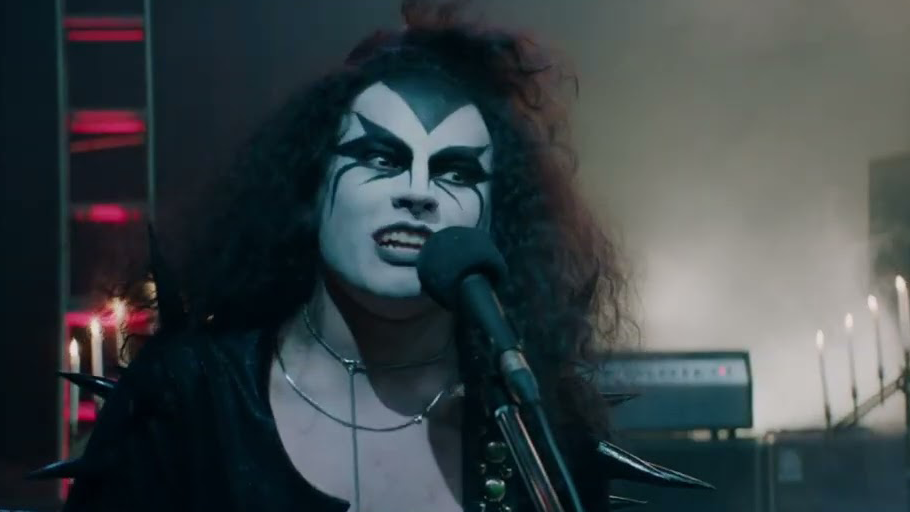
São Paulo, May 2, 2022
Kiss have released 20 studio albums, four simultaneously released solo albums, 12 live albums (including Live In Donington, out now), 14 compilation albums, nine box sets, 60 singles, 15 video albums and three movies. Combined album sales now exceed 100 million worldwide. Kiss have earned hundreds of millions of dollars through their records, live shows, merchandise and licensing deals. They reportedly earned more than $500 million just in the 15 years after their first farewell tour. It’s a level of success well beyond what many could imagine.
How the band members measure Kiss’s success varies, however.
“It’s important to state that we are the luckiest sons of bitches who have ever walked upright,” says Gene. “I’ll say that. I know I’m the luckiest son of a bitch who ever lived, from my point of view. I came to America as a legal immigrant and never could imagine scaling the heights, much less being able to hang around for decades.”
“I have to tell you,” says Eric, “the last few shows we’ve played, when we take the stage, sometimes I say to myself: ‘Eric, you’ve just got to absorb and enjoy this because you’re not going to be able to do this forever, and one day it’s not going to be like this.’ Playing in front of a giant crowd like we did the other night is a very special feeling, and most people will never ever know what that’s like. It’s better than any drug that you can ever imagine.”
For his part, Paul sees endurance as their true measure of success. “Success is not that difficult,” he offers. “Sustaining success is what’s difficult. To first be written off as some sort of joke and forty- eight years later to be playing in front of 65,000 people says it all. Time tells everything – who’s right and wrong. So I’d say that endurance. The obstacles didn’t stop, nor did our determination to knock them out of the way.”
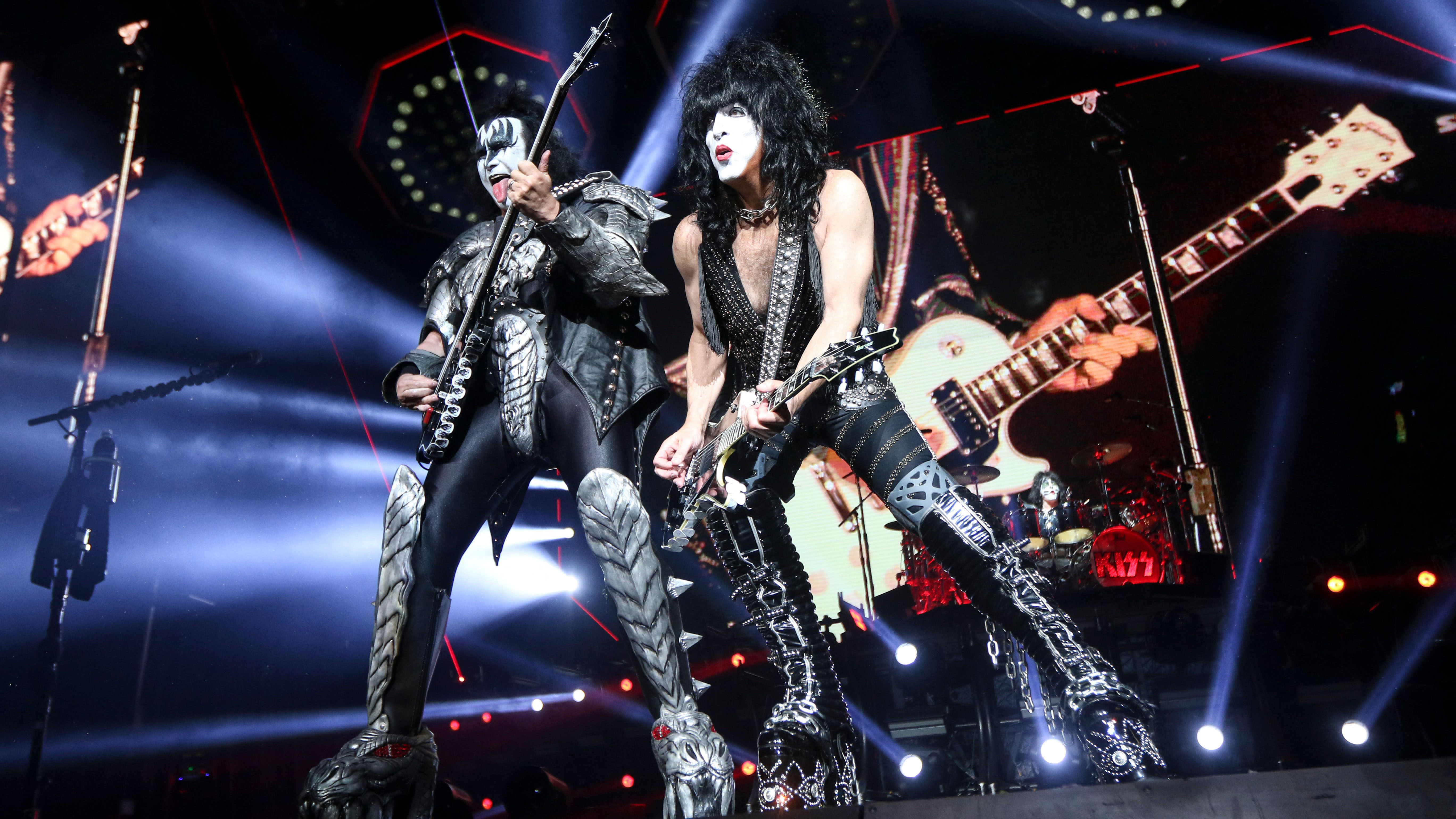
Donington Park, June 2022
As of the writing of this feature, the 2022 Download festival looms just over a month away. Kiss are headlining on the Friday, and it will be their final live show in the UK. They were initially slated to headline Download in 2020, then 2021, but both years the festivals were cancelled due to covid. It’s all looking good for 2022 however, and the band are champing at the bit for one final run at Donington.
“We’re excited!” Tommy enthuses. “To play there and headline their biggest hard rock festival is always an honour, and this year it’s something that we’re really geared up for. It’s too bad that it’s been rescheduled for two years in a row, but it’s finally happening now. We’re really excited and we look forward to playing the UK. We’re all Anglophiles and we love the bands that have come from England, almost better than anywhere else. It holds a special place in our hearts.”
“I never liked ‘Download’,” says Gene, “that word. I think it’s cold and stupid. I don’t want to go down, I want to go up. I know it’s a tech term, but tech terms often sound heartless and cold and stupid. ‘I’m going to go on the web...’ Well fuck, I hope a spider doesn’t eat you up! That word’s taken, don’t use that. ‘I’m gonna use my mouse...’ You’re gonna use a mouse? That word’s taken, come up with your own. So I hated ‘Download’, although the experience was great! I liked Monsters Of Rock. In fact I own ‘Titans Of Rock’.
“So Donington, yes, of course it means something. There’s a ‘take no prisoners’ attitude when you step in the ring. There are a lot of bands who are opening before you – you’ve got to earn that spot. You can’t just say: ‘I was great once.’ No, no. You’ve got to bring everything and hit ’em over the head with all of it, including the kitchen sink. And that’s what we do. And that’s another reason why you want to get off the stage before it gets too late. I have to say, so far, so good. We sound great. You can go on Google and Schmoogle and all kinds of other things that you can press with your fingers and see and hear us live. It’s damn good.”
“The UK has always baffled me,” says Paul. “When I was growing up I was completely baffled by the idea that this small area could turn out an abundance of spectacular bands. And not one style – you could have everything from The Who to the Moody Blues, to Van Morrison, to Traffic, to Led Zeppelin. The list was strange in complexity and diversity. So for us to play the UK has always been with a sense of going to the Holy Land. It really is where everything that we believed in and everything we have built upon came from.”
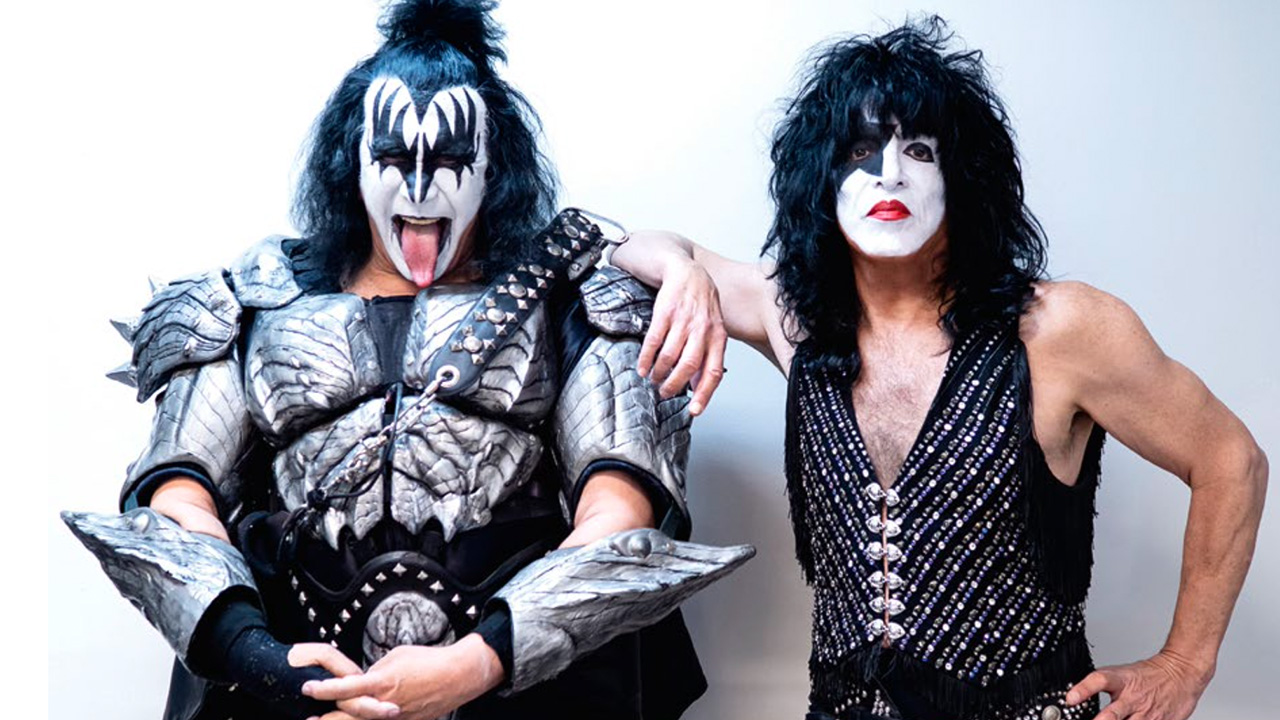
São Paulo, May 2, 2022
For years, talk has persisted that Kiss could one day continue as an active band without any of its original members. It’s an idea floated around by the band themselves, made possible by the luxury of interchanging musicians among four made-up characters. “The Kiss brand and the Kiss entity, from a business perspective, is a huge, valuable commodity, and that’s not going to just stop,” says Tommy.
Tommy, as somebody who started out as a massive Kiss fan, who has worked for the band behind the scenes and played in the band for two decades, is pretty much the ideal guy to carry the flag forward. “I’m probably one person who it would make sense to be involved as time continues, because I can bring a lot to it. What that means, I don’t know, but I have a feeling that I’ll always be involved in the Kiss business somehow.”
Whether or not something like that one day happens, Gene and Paul – the heart and soul of Kiss – are now approaching the finish line as active members of the band they co-founded 50 years ago. Of their legacy, Gene says: “I’m clear about this: the best part of being in Kiss – and maybe our contribution – is that we raised the bar in terms of what people can expect in a live performance.
“We wanted to put the band together that we wanted to see on stage. One that had no rules, and a visual element like no one else, and where you could combine Fourth Of July or Guy Fawkes Day fireworks into the show. Why? Because this thing called rock has no rules. So when you go to a wrestling match and you see fireworks shows, or you see Sir Paul McCartney – and I adore the ground he walks on, remember – and you see fireworks and pyro, where do you think he got that from, The Carpenters?”
“To know what we’ve all been through in the last couple of years,” says Paul, “and are still emerging from – and to see how hungry and in need of this people have been – is something I can’t take lightly. That kind of adoration and appreciation isn’t doled out to every band and every performer. I’m humbled by it, particularly at this point, really knowing that the end is in sight.
“And this reciprocity with the fans, it’s incredible. It certainly makes me think. I find myself going: ‘Who’s going to be iconic? Who’s going to transcend generations and decades? Who’s going to carry the flag?’ Apart from who will be able to overpower those shows with personality and a point of view. That’s what makes the difference. All the shows out there now couldn’t exist without Kiss DNA.”
By turns boastful, funny, self-deprecating and passionate, the two men who started it all can’t fend off their emotions when addressing the actual end – that moment in the final Kiss concert, somewhere in New York City, when the band have played the final note of their final song (and it will almost certainly be Rock And Roll All Nite). They will take their encores – likely several very loud and emotional ones – and eventually retreat from the stage, never to return.
Gene considers this and says: “One of the reasons I’m the luckiest guy on the planet is that I met Paul Stanley. In our case, one plus one equals three. He’s sort of like the brother I never had. We disagree on all kinds of things but nothing matters. We’re not Jagger/Richards and we’re not Lennon/ McCartney. Not in our wildest dreams. But even those guys turned on each other. That’s never happened here. And never will.”
Paul draws a deep breath, puts himself in that position for a moment and then says: “What won’t I feel? It’s monumental. It’s overwhelming. It will be incredibly emotional, trying to absorb the enormity of what we’ve done, and I’m quite certain, besides the laughter, there’s going to be enough tears to go around.”
That morning after the night before, the world as we know it will be a little quieter and a whole lot less exciting.
Hailing from San Diego, California, Joe Daly is an award-winning music journalist with over thirty years experience. Since 2010, Joe has been a regular contributor for Metal Hammer, penning cover features, news stories, album reviews and other content. Joe also writes for Classic Rock, Bass Player, Men’s Health and Outburn magazines. He has served as Music Editor for several online outlets and he has been a contributor for SPIN, the BBC and a frequent guest on several podcasts. When he’s not serenading his neighbours with black metal, Joe enjoys playing hockey, beating on his bass and fawning over his dogs.
